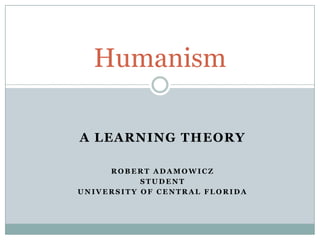
Humanism
- 1. A Learning Theory Robert Adamowicz Student University of Central Florida Humanism
- 2. Origins Humanism came out in the 1960’s by Carl Rogers, Abraham Maslow, and later on by Malcolm Knowles. Maslow is considered to be the “father” of American Humanism. He founded the Hierarchy of Needs. Maslow believed that at the top of the Hierarchy is Self-Actualization. To be considered in that category you must be reality-centered and problem-centered, which can be considered the foundation of humanism. To be reality and problem centered, it forces you to become creative, moral and a problem solving.
- 3. Origins cont’d Rogers also believed in actualization. If you did reach self actualization you were considered a “Full Functioning Person”. Rogers engaged a method called the organismic valuing process. This process judges experiences and based on those experiences (good or bad), it will be proven to have you either avoid something or seek after it. This is what the teaching theory of humanism is all about. While Knowles, who idolized Rodgers came in the mid 1970’s and proposed self-directional classes. Abraham Maslow Carl Rogers Malcolm Knowles
- 4. What is Humanism? As summarized Humanism is a “paradigm/philosophy/pedagogical approach that believes learning is viewed as a personal act to fulfill one’s potential.” This basically gives students the reigns in which to pick what they are interested in and study that topic. The teacher has different role than in most learning styles . As a teacher you would be more of a facilitator. By this you would just go along with what the students want and have to teach according to their interest. In this learning style, students are free to judge what is good for them to learn and what is bad for them to learn. This style is very effective for students that are already highly motivated. For those that are unmotivated it is slightly harder for them to accomplish because there is no push from a teacher to induce what to learn. Rather students need to be at a certain level where they want to learn.
- 5. Student Teacher Curriculum is up to the students. They learn what they want to learn, when they want to learn it. It is based on students will know what lessons will be useful to them and which is just a waste of time. As long as students have a passion or drive to learn this theory becomes easy for teachers. Students that don’t have that drive to learn will either need to be pushed by a teacher or parent or try another teaching theory, because if students don’t want to learn they won’t. Teachers would almost guide students as they set off into their own educational journey to learn. Facilitating students would be the main role of teachers. Also being careful not to force what to learn but rather force wanting to learn something on the student is genuinely interested in. Classroom Implications
- 6. Personal Use In My Classroom I personally could not have students pick the exact curriculum because there are standards of learning that I would have to uphold with state and federal standard. Ways that I could fit some of this theory into my style of teaching is to: To help students learn, set realistic goals. Allow students to choose between a selection of lessons, all of which would teach the same lesson just in different ways. Have group discussions and just facilitate the conversation instead of controlling it. Have group work, this gives an open field to be responsible yet creative for their class work.
- 7. A Word From Experts… According to a 1977 Aspy and Roebuck study of 600 teachers from kindergarten though 12th grade, they found that students in classrooms of high facilitative teachers (Humanism): missed four fewer days of school (5 as compared to 9 for low facilitative teachers); increased scores on self-concept measures; greater gains on academic achievement measures, including both math and reading scores; presented fewer disciplinary problems and committed fewer acts of vandalism to school property; and were more spontaneous and used higher levels of thinking (knowledge versus comprehension through evaluation).
- 8. Credits http://www.learning-theories.com/humanism.html http://www.learning-theories.com/experiential-learning-kolb.html http://www.learning-theories.com/maslows-hierarchy-of-needs.html http://www.infed.org/thinkers/et-knowl.htm http://webspace.ship.edu/cgboer/maslow.html http://wilderdom.com/personality/L10-2Humanistic.html http://www.edpsycinteractive.org/topics/affsys/humed.html http://forpd.ucf.edu/facilitators/fff/Images/knowles.jpg http://images1.wikia.nocookie.net/psychology/images/thumb/d/d6/Carl_Rogers.jpg/220px-Carl_Rogers.jpg http://www.abraham-maslow.com/maslow_Images/Abraham_Maslow.jpg